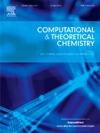Boronate ester-based covalent organic framework as a porous biosensor for anticancer and anti-inflammatory agents: A DFT study on curcumin and crizotinib
IF 3
3区 化学
Q3 CHEMISTRY, PHYSICAL
引用次数: 0
Abstract
This study explores the potential of boronate ester-based COF-1 as a biosensor for anticancer and anti-inflammatory drugs, specifically curcumin and crizotinib, using Density Functional Theory (DFT). Interaction energies, NCI, QTAIM, EDA, and FMO analyses indicate that van der Waals forces mainly govern adsorption. Crizotinib exhibits stronger binding, greater charge transfer, reduced HOMO-LUMO gap, and higher dipole moment, enhancing sensor selectivity and conductivity. Recovery time analysis suggests faster desorption of crizotinib, supporting its suitability for real-time sensing. Overall, COF-1 shows promise as an effective sensor, especially for crizotinib, with applications in drug monitoring and biomedical diagnostics.

基于硼酸酯的共价有机框架作为抗癌和抗炎剂的多孔生物传感器:姜黄素和克唑替尼的DFT研究
本研究利用密度泛函理论(DFT)探讨了硼酸酯基COF-1作为抗癌和抗炎药物(特别是姜黄素和克唑替尼)生物传感器的潜力。相互作用能、NCI、QTAIM、EDA和FMO分析表明,范德华力主要控制吸附。克里唑替尼表现出更强的结合、更大的电荷转移、更小的HOMO-LUMO间隙和更高的偶极矩,提高了传感器的选择性和电导率。恢复时间分析表明克唑替尼的解吸速度更快,支持其实时传感的适用性。总的来说,COF-1有望成为一种有效的传感器,特别是对克里唑替尼,在药物监测和生物医学诊断方面的应用。
本文章由计算机程序翻译,如有差异,请以英文原文为准。
求助全文
约1分钟内获得全文
求助全文
来源期刊

Computational and Theoretical Chemistry
CHEMISTRY, PHYSICAL-
CiteScore
4.20
自引率
10.70%
发文量
331
审稿时长
31 days
期刊介绍:
Computational and Theoretical Chemistry publishes high quality, original reports of significance in computational and theoretical chemistry including those that deal with problems of structure, properties, energetics, weak interactions, reaction mechanisms, catalysis, and reaction rates involving atoms, molecules, clusters, surfaces, and bulk matter.
 求助内容:
求助内容: 应助结果提醒方式:
应助结果提醒方式:


